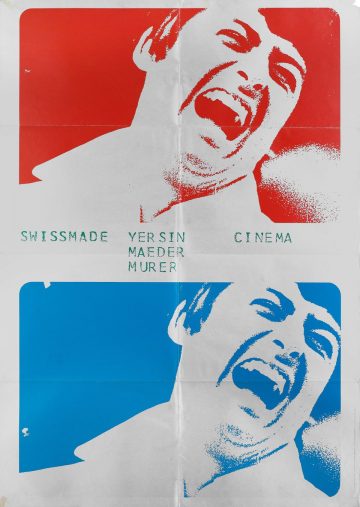 Quite the oddity, this: a 1968 science fiction themed three parter from Switzerland that’s known primarily for the fact that one of its segments was designed (not directed, as the imdb erroneously reports) by the late H.R. Giger. That, however, didn’t stop the film from falling into complete obscurity. Until recently it was believed lost, but now that it’s been found let’s take a look at what it might (or might not) have to offer.
Quite the oddity, this: a 1968 science fiction themed three parter from Switzerland that’s known primarily for the fact that one of its segments was designed (not directed, as the imdb erroneously reports) by the late H.R. Giger. That, however, didn’t stop the film from falling into complete obscurity. Until recently it was believed lost, but now that it’s been found let’s take a look at what it might (or might not) have to offer.
Part one, “The Naysayer,” was directed by Yves Yersin. It takes place in the far-off year 1980, when the Swiss intellectual Henri returns to his homeland after a lengthy sojourn in Brazil. Having fled Brazil after it was overtaken by a fascist coup, Henri finds that Switzerland has likewise been felled by overzealous authority figures and an apathetic public. He attempts to start a revolution, but succeeds only in attracting the attention of some filmmakers seeking to make a portmanteau film about the future of Switzerland, and want Henri to star. (That film is, presumably, the very one we’re watching.)
Part two is “Alarm,” directed by Fritz E. Maeder. Heavily music-driven with very sparse dialogue, it features a man beset by flashbacks of happier times, both personally (in blissful memories of him and a former lover) and collectively (in a vision of people in some past era riding in horse-drawn carriages). The dystopia in which he finds himself, alas, is a Hell on Earth in which he can’t seem to get promoted at his job.
It’s in the third and best segment, “2069 (Or Where Futurologists and archeologists say good night to each other),” that Mr. Giger gets to shine. Directed by Giger’s longtime pal Fredi M. Murer (of the later features ALPINE FIRE and VITUS), it’s set in an apparent utopia that has been strictly divided into haves and have-nots. Here people are killed off at age 41, and everything is run by a centralized “Brain Center” with which citizens can get in touch via “Brain Corner” kiosks located throughout the city.
The entire segment is presented as a faux-documentary, and visualized largely an eye-shaped graph. This POV eventually reveals itself as that of a Giger designed alien being who’s making a recording (the critter actually has a reel-to-reel recorder in its chest) of what it finds. At one point the alien enters an art gallery displaying several paintings by its creator, and then an operating room, having failed in its mission and been forced to go underground.
Onto the filmmaking: “The Naysayer” is choppily edited, excessively talky and ultimately not very compelling at all. Director Yves Yersin appears more interested in imparting a half-baked political allegory about late 1960s Switzerland than a coherent vision of the future.
“Alarm” has some striking elements—inverted mirror shots, kaleidoscope POVs, etc.—but suffers from an overly cryptic narrative, a remarkably poor use of music (especially considering that the entire episode is so music-dependent) and a protagonist whose sole point of interest is the fact that he has florid memories.
“2069,” on the other hand, is quite interesting. It’s far from great, and indeed has a number of shortcomings (due most likely to its creators’ filmmaking inexperience), but exudes a genuinely otherworldly, futuristic feel—the only one of SWISSMADE’S segments about which that can be said. The design by H.R. Giger isn’t up to the standards of his game-changing work on ALIEN, but is fully up to Fredi M. Murer’s modest goals. Precisely what “2069” might have to say about Switzerland in the 1960s I don’t know, but it does stand as an intriguing oddity ripe for rediscovery. As for SWISSMADE’s other two segments, they can be discarded.
Vital Statistics
SWISSMADE
Yves Yersin Productions
Directors: Yves Yersin (Segment one)
Fritz E. Maeder (Segment two)
Fredi M. Murer (Segment three)
Producer: Yves Yersin
Screenplay: Michael Contat, Yves Yersin (Segment one)
Jorg Steiner (Segment two)
Fredi M. Murer (Segment three)
Cinematography: Witold Lesiewicz (Segment one)
U. Kohler (Segment two)
Doris Ouarella (Segment three)
Editing: Yves Yersin (Segment one)
Lia Sinonyi (Segment two)
Charly Kresling (Segment three)
Cast: Elsa Skorecka, Erika Denzler, Franck Jotterand, Jean-Louis Cornuz, Pietro Sarto, Clelia Babacantz, Gil Pidoux, Yves Secretan (Segment one)
Herbert Herrmann, Jocko Kanitzer, F. Kutschera, P.F. Binz, K. Barthel (Segment two)
Esther Altorfer, Hannes Bosshard, Carmen Corti, Yvette Epper, Kurt Erler, Kiky de Groot, Manon Kueng, Anneli Leskinen, Ruthine Murer, Sabine Murer, Tina Gwerder, H.R. Giger (Segment three)
